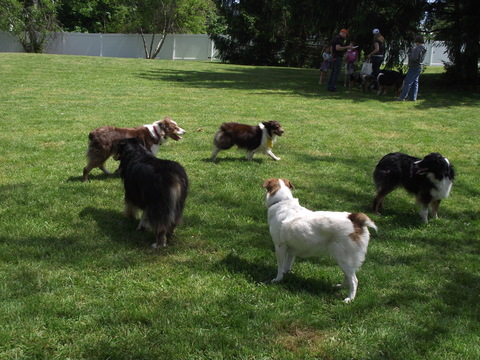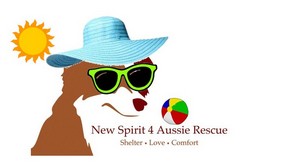Is An Aussie the Right Dog For You?
It’s advisable for a potential adopter to read and heed these rules. To do otherwise will lead both the dog and the adopter to a fork in the road.
Aussies can be keen territorial protectors
You may like the idea of a dog alerting you to visitors, but unless you know how to be a pack leader and exert some control, an Aussie may take it further than you want. Aussies should not be thought of as guard dogs, or encouraged to act like one.
Aussies often have a strong prey drive.
His agility and lightning speed can make him a formidable match for predator and prey alike. Of course, unless you own a ranch, he would probably be content just to keep rabbits, gophers, and squirrels out of your back yard, but he may also see fast moving bikes or running children as needing his attention. You will need to lay the foundation as pack leader for what is off limits.
Aussies are high energy.
They were bred to be a working dog and therefore they need a job to do or they get bored and invent one – like herding the kids or shredding your socks.
Aussies need physical exercise and mental challenges daily
Some Aussies are content with a game of fetch, a good run, and a Frisbee chase now and then. But many Aussies who end up in rescue are there because their people could not give them enough exercise or mental stimulation. Be prepared to do some obedience training, agility, flyball, herding, or take them for long stimulating walks.
Human companionship is a must.
Aussies can kick back while you’re at work but they’ll want your attention all the rest of the time. We classify Aussies as being more or less Velcro. There is no non-Velcro Aussies. If you just want a dog to cuddle briefly and then go snooze in the corner, an Aussie probably isn’t the right dog for you.
Aussies are not non-shedding
Aussies have a double coat — an underlayer of fine down and a top layer of longer, sleeker guard hair. The underlayer thickens and grows as day length shortens in anticipation of colder winter days, and starts to shed when day/night length is equal in late March. You’ll hear this referred to as “blowing coat”, probably because that’s when large tufts of it start blowing around your house and yard!
The boys are “in coat” year round because being the male; nature dictates that they always need to look good for the ladies. For you, this means they’ll be shedding all year round to some extent.
The girls will tend to blow coat in spring, and then be sleek and fairly shed-free.
Any dog in poor condition that has an abrupt shift to a better diet will typically blow coat after about three months of the new regimen, and after having pups, Mom dogs will usually blow coat from the hormone shift.
Both sexes require regular brushing to keep mats and tangles at bay. A high quality diet, especially one with some meat, will usually help reduce shedding.
If you’re willing to accept the realities of life with an Aussie, you will be rewarded with years of faithful dedication and active companionship. They are beautiful, sometimes animated, and always intelligent dogs. Easily trained and versatile, they are often found among the ranks of therapy dogs, search and rescue dogs, and guide dogs.
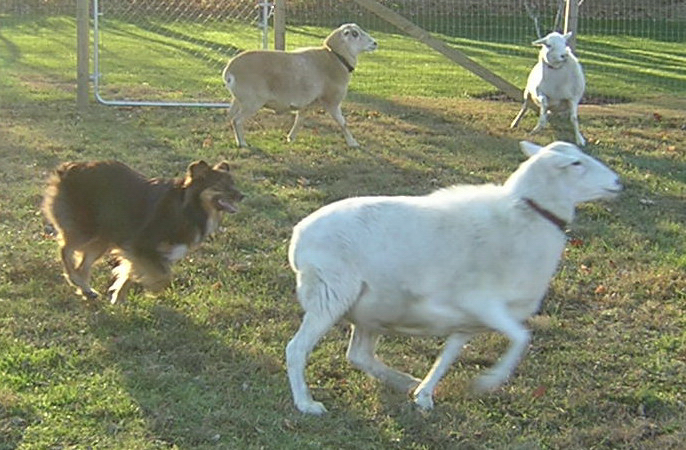

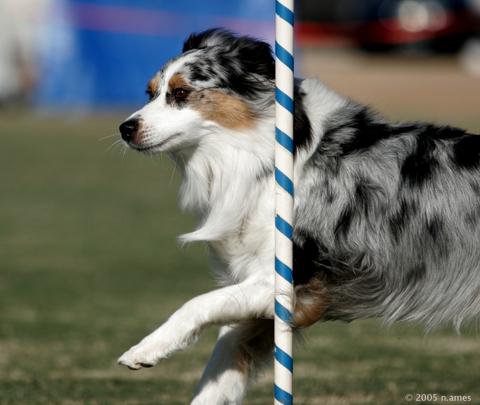
Facts about Aussies at a glance.
- black tricolor (solid black with white and copper trim)
- red tricolor (solid red with white and copper trim)
- blue merle (black with color pigment split in patterns)
- red merle (red with color pigment split in patterns)
- black bi (solid black with white or cream trim)
- red bi (solid red with white or cream trim)
- Other variations include “lethals” – mainly white dogs resulting from merle-to-merle breedings
- Low rate of hip dysplasia but it can occur
- “Lethals”- result of merle-to-merle cross, often have hearing or vision issues. Dog appears mainly white.
- Epilepsy can occur, sometimes severe, but isn’t common
- Cancer can occur but isn’t common
- Allergies can occur, usually to inhaled allergens, but not common
- Fancy (show dogs) often with thicker leg bone and heavier coat
- Working type, usually less flashy, more heavily muscled, lighter coat
- AKC
- ASCA – Australian Shepherd Club of America
- NSDR – National Stock Dog Registry
- Other registries exist solely for the purpose of registering pet store and otherwise unregisterable dogs
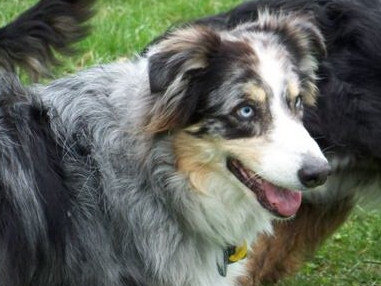
Aussies: a brief history
Herding 101 and the Aussie Impact on Other Breeds
